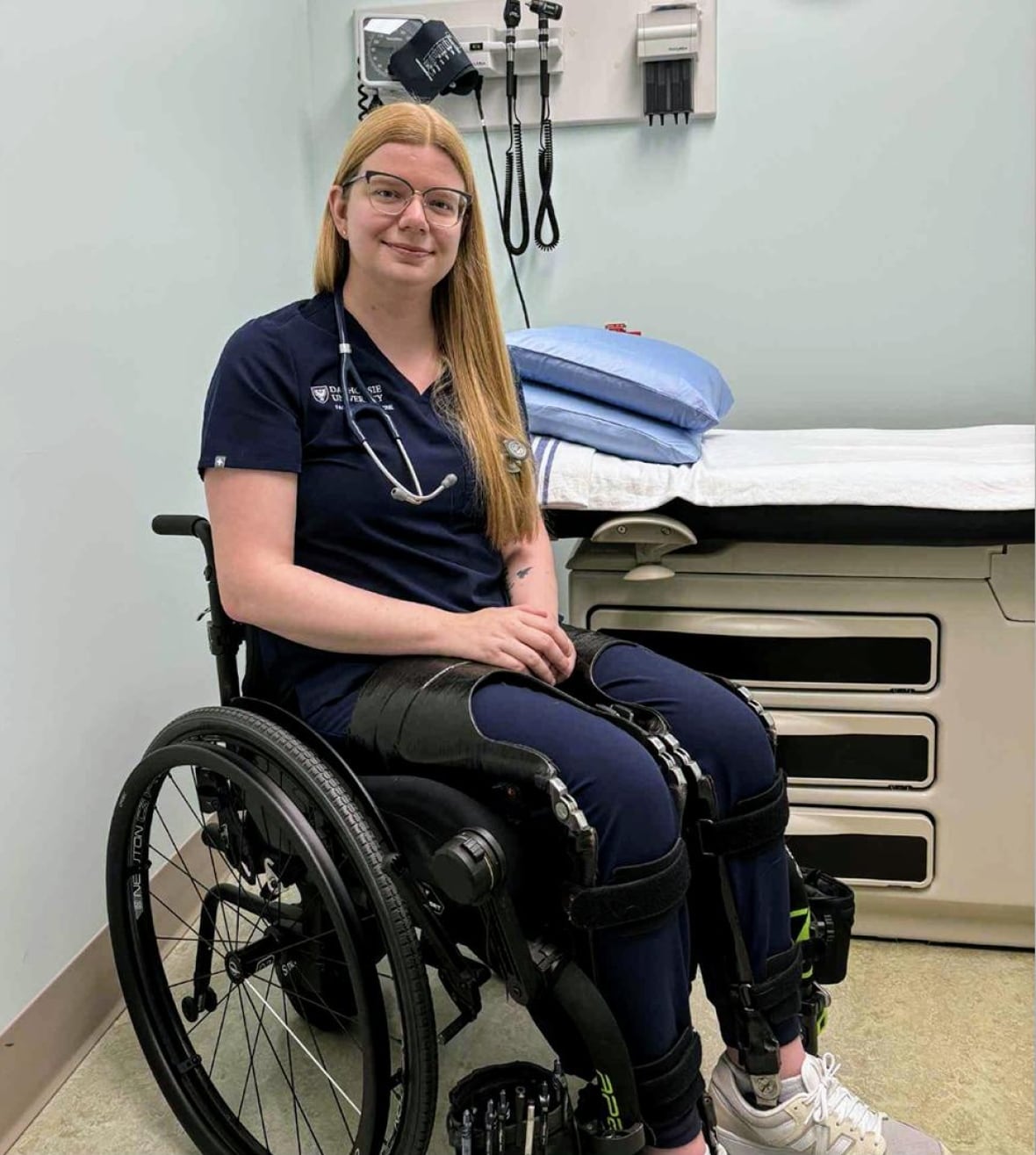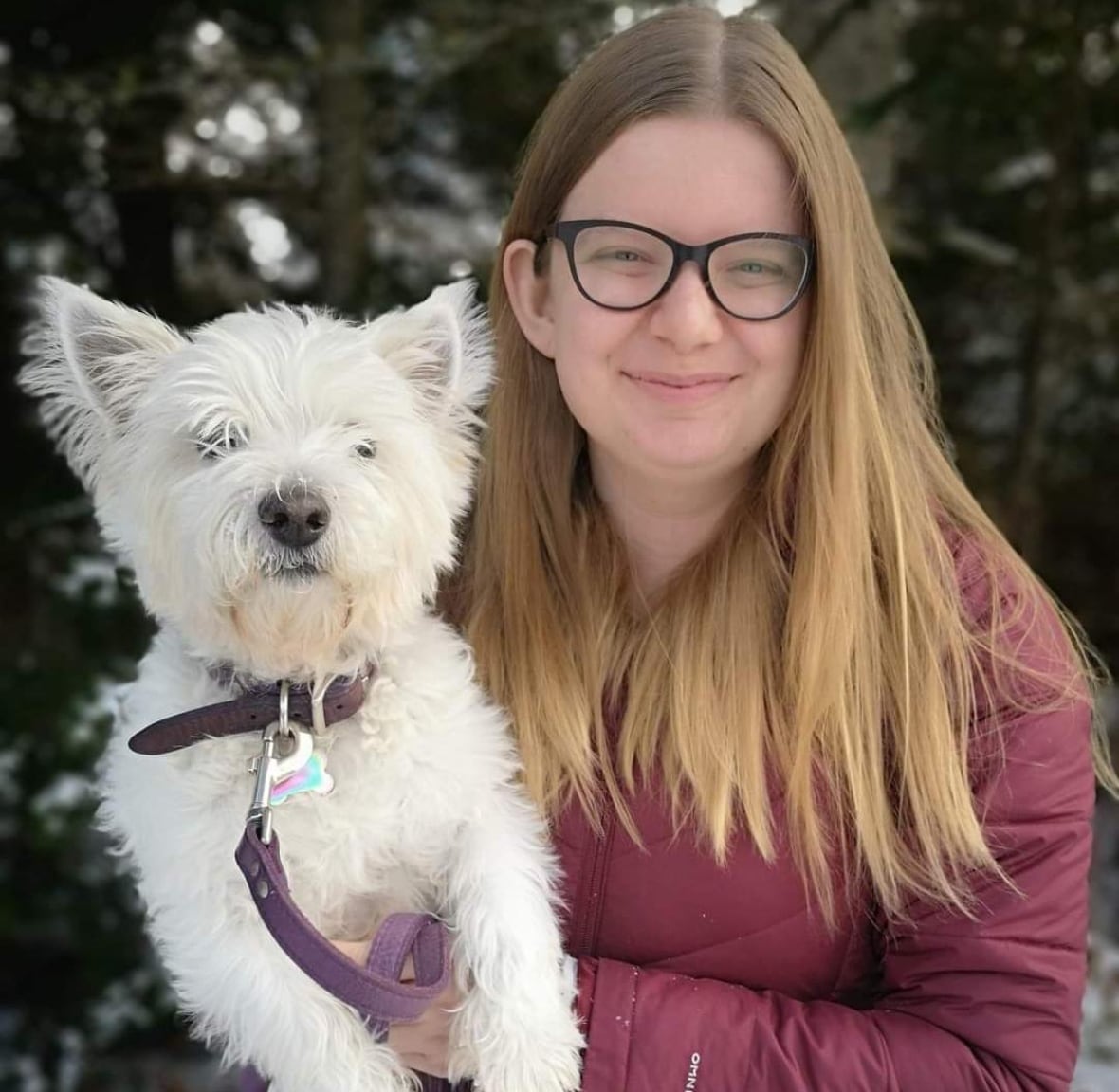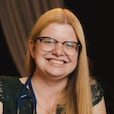People assume I can't be a doctor because of my disability
Being among the first has come with unique challenges and can often feel very isolating

This is a First Person column by Kendra Hebert, who lives in Garnett Settlement, N.B. For more information about First Person stories, see the FAQ.
It was the first day of a new rotation. I entered the ward wearing scrubs, my stethoscope draped around my neck and my hospital ID clipped to my shirt. Indistinguishable, I thought, from any other medical student.
As I approached the nursing station in my wheelchair, a nurse I hadn't met before looked up and asked, "Are you here for an appointment?"
I paused, momentarily caught off guard.
"No," I replied. "I'm the new medical student starting today."
Her face changed instantly; an apology, an explanation. She said she hadn't meant anything by it, she had just seen my wheelchair first and assumed I was a patient.
It was a brief exchange, but one I've experienced in various forms more times than I can count. Still, it stayed with me. It's a quiet, persistent reminder of how easily people make assumptions when you don't fit the expected image of a doctor.
My name is Kendra Hebert, and I'm a third-year medical student at Dalhousie Medicine New Brunswick. I have a physical disability and use a manual wheelchair, crutches and leg braces.
That puts me in a unique position, and it's not a role I ever imagined for myself.
Becoming a doctor has been my lifelong dream, but I questioned whether there was a place for me in medicine.
I was able-bodied for most of my life. At 21, my mobility declined rapidly without an explanation. Within three months, walking was a challenge. I was an active and athletic person and the sudden loss of mobility was devastating.
Without a diagnosis, the uncertainty was unbearable. I didn't apply to medical school. Instead, I began my master's in experimental psychology. I love research and am still actively involved in it today, but I felt disconnected from the people I wanted to help.
Eventually, I received a diagnosis. My genetic disorder is incurable, but it's not progressive. With the right care team and adaptive devices, I regained much of my independence.
That's when I decided to apply to medical school, terrifying as it was. I had never seen a physician with a disability like mine. There were doubts and there was pushback from people who questioned if I would be capable. But there was also incredible support from my family and friends, and especially from my twin sister, Courtney.

Courtney and I shared the same condition, but it affected her internal organs. At the same time that I was adjusting to my changing mobility, she got sick. In just 18 months, she had more than 30 hospital admissions, multiple procedures and surgeries.
We shared the same dream and applied to medical school together. The application process takes a year; you apply in July to start the following August. Courtney passed away that November due to complications from treatment for her illness, just a few months before I received my acceptance letter.
Her memory is why I continue. Her loss reminds me every day why I do this.
I try to focus on the positive, but it's not always easy. Hospitals are often inaccessible. My wheelchair doesn't fit everywhere. While most public areas are accessible, staff spaces rarely are.
Tasks as basic as opening a door can become major obstacles when spaces aren't designed with accessibility in mind. I've had to grow more comfortable relying on others and asking for help, not because I am incapable, but because these spaces disable me.
As a disabled student, I'm often mistaken for a patient. I'm talked down to, babied or told I'm "inspiring" just for existing. People often ask, "What's wrong with you?" before they ask my name.
I try to plan ahead. I can't just show up somewhere like my classmates. Even with an accommodations plan and many supportive people behind the scenes, things get missed because this is uncharted territory.
At times, I've had to advocate for the same learning opportunities my peers receive without question. I try to choose rotations where I know that I will be treated as a learner and not a burden.
I can adapt to inaccessible spaces, but I can't change inaccessible attitudes. I'm still trying to accept that.

Yet for every negative encounter, there are many uplifting ones. Strangers tell me they're proud of me and they're glad to see someone like me in medicine. They know I understand what it's like to be on the other side.
One such moment happened during my internal medicine rotation. I was asked to do a consult for a patient who had been admitted for several weeks. Despite countless tests and input from multiple physicians, her condition continued to decline. No one had found a clear answer.
When I entered her room, she was sitting up in bed, visibly unwell and exhausted. It was written all over her face. I introduced myself and invited her to tell her story. As a medical student, I had one luxury many others on the team didn't: time.
So I listened. I asked questions. I listened some more. I heard about her fears, frustrations and the long days of feeling unseen.
I couldn't solve her mystery. But at the end of our conversation, she reached out, took my hand and thanked me. She said it was the first time she felt someone had truly listened, from start to finish. For the first time, she felt understood.
Being the first can feel isolating and overwhelming. But it can also feel extraordinary. I know how much it would have meant to see someone like me in medicine when I was starting out. I hope to be the mentor and role model that I needed — a reminder that we belong here.
Do you have a compelling personal story that can bring understanding or help others? We want to hear from you. Here's more info on how to pitch to us.

